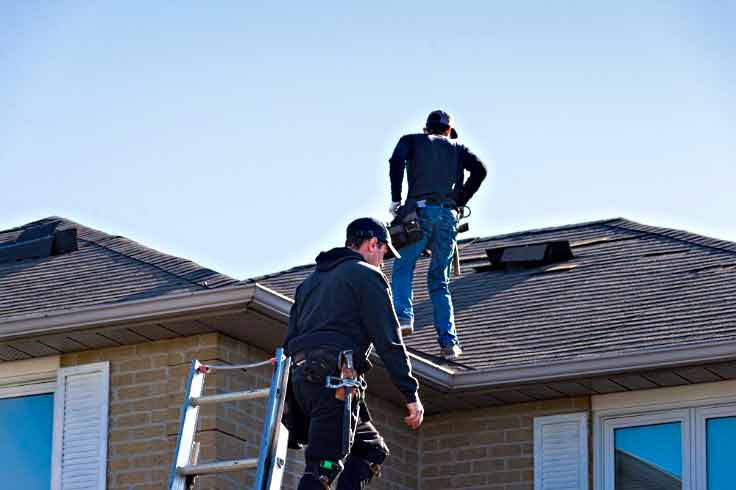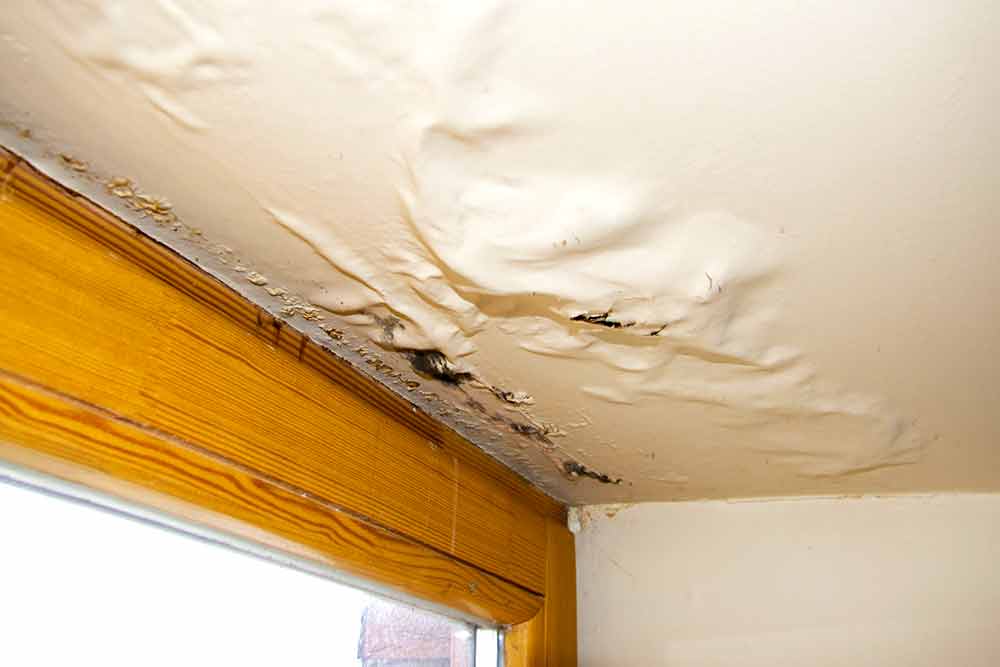Written by Andy Gurczak
August 1, 2021
Many states require the roof certified from inspection, especially those that see a higher amount of snow and hail. In fact, many lenders require this to be done before they will cut a check. Meanwhile, insurance companies demand it before selling you insurance. In most states, a properly ventilated roof can last 20 years or more. Other states where the snow is heavy, they often have to be replaced every five years. While having a secure roof is one of the most important parts of a home, it can also be a very expensive investment, especially if you bought a home under the impression that everything was well. For this reason, a roof inspection is extremely important.
Roof inspections are simply inspections that determine the integrity of a roof, how long it may last, and when replacement will be necessary. A roof inspector will likely not climb up on your roof to pull up shingles or tiles. Instead, roof inspectors have special procedures wherein they can determine the lifespan of a given roof without tearing into it. Roof inspections are not all that expensive, and these inspections can give you and your lenders and insurance carriers peace of mind. When your roof is taking a heavy snowfall or abundant rain, indeed, you will want to sleep comfortably knowing that you are secure from above.
Things You Should Know About the Roof Inspection Process
Frequent professional roof inspections is the best way to learn about potential roofing problems so you can address it before an emergency arises. In fact, the National Roofing Contractors Association recommends scheduling a roof inspection during the fall, spring and following major storms that involve high winds, hail or flying debris. Regardless, it’s typical and probably for the best, for homeowners to receive a roof inspection at least once a year. The following are some questions you might have, if you’ve never had your roof inspected.
First, what are the warning signs that my home might need a roof inspection?
In the first place, the two most obvious signs that your roof needs inspection from a professional are leaks and drafts. Secondly, you should also check for dark streaks and stains on your ceiling. These can also be indicators that your roof is leaking and moisture is damaging both your roof and home’s interior.
On the other hand, cool drafts are not always attributed to your roof. However, a faulty roof can lead to problems with proper air circulation. In fact, it could even cause your energy bills to rise.
Second, what is the difference between an exterior roof inspection and interior inspection?
Interior roof inspection includes checking the attic for proper insulation, ventilation, as well as moisture and mold. On the other hand, an exterior inspection consists of climbing up on the roof and checking for leaks and proper flashing. Equally important, is to check the condition of your shingles and chimney. After the inspection is done, the professional should give you a detailed report of what needs fixing, as well as execute a plan so that it can be fixed properly.
Third, are roof inspectors different from home inspectors?
Roof inspectors usually have specialized equipment and techniques to thoroughly inspect rooks. For example, roof inspectors do infrared roof inspections where they don’t even have to touch the surface of the roof itself to determine a roof’s integrity. During this process, the inspector uses infrared rays to locate irregularities in the temperature of the roof. Hot spots can show a roof inspector just exactly where heat is escaping.
Fourth, what should I expect from a professional roof inspection?
A roof inspector will be looking for leaks, unusual wear and tear, damage caused by windblown debris, organic growth issues, problems that may have occurred during shingle installation, besides other possible damages. Ultimately, a roof inspection gets broken into four facets: structure, materials, interiors, and workmanship.
- Structural Inspection: For example, in this stage inspectors check for uneven roof planes and signs of sagging, as well as examine the condition of the soffit, fascia, and gutter system. Masonry chimneys are inspected for cracks, crumbling grout, and damage to chimney caps. The inspector may also check the venting in your attic.
- Material Inspection: For this facet, inspectors look for loose, missing, or curling shingles. Additionally, they check for stains, moss, rust, and missing flashing or fasteners; as well as verify the rubber boots and seals around vent pipes, looking for gaps or deterioration.
- Interior Inspection: Roof leaks, ultimately damage the interior of your roof. For this reason, the inspector will check ceilings, the attic, and interior walls for water stains, mold, rot, and other signs that water is making its way into your house.
Workmanship Inspection: Finally, a thorough inspector will examine your roof for problems in workmanship that could increase the risks of roof damage in the future.
Fifth, does the material of my roof influence the outcome of my roof inspection?
What a roofing professional will look for during an inspection varies depending on what the roof is made of. For instance, if you have a shingle roof, there are a few common issues that a professional will look for during a roof inspection:
- Water damage: This type of damage occurs for a number of issues. For one thing, it could be because there is no proper drainage due to clogged gutters. Furthermore, water damage could also arise from wrongly installed or damaged flashing, as well as missing shingles.
- Mold damage: Mold growing around the chimney and on attic insulation are signs of excessive water damage. During the interior inspection, a roofing professional will pay special attention to these areas.
- Shingle deterioration: Besides missing or loose shingles, there could also be rotting or algae growth on the shingles
When inspecting a metal roof, identifying leaks is also a top priority. Like shingle roofs, inspectors look for certain damages in metal roofs:
- Rust: Maybe the most noticeable type of damage, rust will eat away at your metal roof. As a result, it creates large holes that will allow water to leakage. Even worse, it could cause roofing panels to literally fall apart.
- Loose seams: Depending on the weather, metal roofs expand and contract, thus loosening screws and separating seams.
- Damaged flashing: Flashing that has begun to pull apart can allow water to seep underneath your metal roof. Consequently, leading to corrosion on the underside of the panels.
Sixth, how much does a roof inspection cost?
The national average cost for a roof inspection is $290 to $350. Most roof inspectors charge a flat fee but others charge by square footage of the roof. However, the cost will vary depending on the size, slope, and material of your roof, as well as the specific type of inspection.
Type of roof inspection
There are three different types of roof inspections: physical, drone, and infrared. First thing to understand is that each one comes at a different price point.
1. Physical roof inspection
Physical inspections are valued at an average of $75 to $200 nationwide.
In this type of inspection, a certified contractor climbs onto the roof and examines it, as well as all that’s attached to it.
2. Drone roof inspection
If the roof is difficult to access, an inspector will likely use a drone to conduct the inspections. With this in mind, you can expect, the average cost of this inspection is anywhere in between $150 to $400. The inspector flies a camera equipped drone over the roof and captures close-up footage of all surfaces
3. Infrared roof inspection
Infrared, or thermal roof inspections, use a drone equipped with a camera that can capture thermal images of your roofing. This type of inspection can go for $400 to $600. Indeed, this is the most expensive type of inspection due to the technology involved.
Size of the roof
Roof inspectors usually add a surcharge for an especially large roof. Meanwhile other inspectors charge by the square foot of roof area.
Type of roofing material
Uncommon roofing material like wood shingles or barrel tile, often account for more expensive inspections. For example, the price for a slate tile roof inspection can be four times more expensive than an asphalt roof inspection.
Roof accessibility
For a very high or very steep, you may have to pay an additional charge for a visual inspection. In fact, you might have to upgrade to a pricier drone inspection.
Attic inspection as part of a gull roof inspection
It’s unlikely that a roof inspection includes a check of the attic. Consequently, to get an attic inspection, you should expect to pay an additional $125 to $200.
Roof certification after your roof inspection
Roofing inspectors can order a roof certification letter from your roofing contractor as part of their inspection. As a result, it could cost $75 to $200 additional to the roof inspection fee.
Seventh, who should I hire to do a roof inspection?
It’s best to hire a third party roof inspection company who isn’t going to do the repairs so that there will be no financial incentive to find problems. Be aware of free roofing inspections from roofing contractors, who then offer to repair the damage they find. Your best bet is hiring a certified roof inspector that has the proper training to look at different types of roofs and roof materials. A roofing inspector can tell you if it needs preventative repairs and how many years it has left before you’ll need to replace it.
Eighth, how do I hire a professional to inspect my roof?
When hiring a professional roof inspector, there are certain things you should be on the lookout for.
- First and foremost, it’s in your best interest to make sure the inspector you hire is certified to do roof inspections. For instance, there is such a thing as home inspectors that are also certified to carry out roof inspections. In addition to verifying their certification, read their reviews to check the quality of their work and make sure they have all the required insurance.
- Equally important, is to ask about what’s included in their costs of the inspection.
- Furthermore, be sure to hire a professional who is an FAA-certified drone pilot, to do your infrared and drone inspection.
- Last but not least, consider getting multiple free estimates for roof inspections. Make sure the estimate is specific and details individual costs.
Best way to beat the insurance company is to hire AllCity Adjusting
At AllCity Adjusting we help residential and commercial clients alike get the claims support they need. Moreover, we have over 50 years of combined experience helping get our clients the max settlement time and time again. If your claim has been low balled or denied entirely we can help increase your maximum settlement. Call us today for a FREE consultation. Experience the AllCity difference.
Real Support When You Need It!
Related Articles
7 Red Flags That Indicate You Need to Hire a Public Adjuster
If you own property, managing roofing insurance claims might seem tough. Knowing how to quickly deal with roof damage insurance claims from water, weather, fire, or unexpected events is helpful. In this guide, we’ll share useful tips to help you understand and work through roofing insurance claims more easily, aiming for a quicker solution.
Navigating Fire Damage Claims: What Every Property Owner Should Know
If you own property, managing roofing insurance claims might seem tough. Knowing how to quickly deal with roof damage insurance claims from water, weather, fire, or unexpected events is helpful. In this guide, we’ll share useful tips to help you understand and work through roofing insurance claims more easily, aiming for a quicker solution.
The Role of a Public Adjuster in Water Damage Claims
If you own property, managing roofing insurance claims might seem tough. Knowing how to quickly deal with roof damage insurance claims from water, weather, fire, or unexpected events is helpful. In this guide, we’ll share useful tips to help you understand and work through roofing insurance claims more easily, aiming for a quicker solution.
Understanding Water Damage Claims: A Comprehensive Guide for Homeowners
If you own property, managing roofing insurance claims might seem tough. Knowing how to quickly deal with roof damage insurance claims from water, weather, fire, or unexpected events is helpful. In this guide, we’ll share useful tips to help you understand and work through roofing insurance claims more easily, aiming for a quicker solution.
Essential Traits and Skills for a Successful Public Adjuster
If you own property, managing roofing insurance claims might seem tough. Knowing how to quickly deal with roof damage insurance claims from water, weather, fire, or unexpected events is helpful. In this guide, we’ll share useful tips to help you understand and work through roofing insurance claims more easily, aiming for a quicker solution.
Tips Expedite the Process :Commercial Roofing Insurance Claims
If you own property, managing roofing insurance claims might seem tough. Knowing how to quickly deal with roof damage insurance claims from water, weather, fire, or unexpected events is helpful. In this guide, we’ll share useful tips to help you understand and work through roofing insurance claims more easily, aiming for a quicker solution.
Stay Up to Date With The Latest News & Updates
Don't Wait - Get More
Get a free 1 hour consultation on your next call. So call today and challenge the insurance company narrative on your policy claim. We can help you with all your public adjuster claims support. Let us help you get more.
Join Our Newsletter
Do you want to learn more about public adjusting. In this newsletter we create helpful tips and hints and you will receive notifications when we post new articles.
Follow Us
Follow us on the following social networks.







Recent Comments